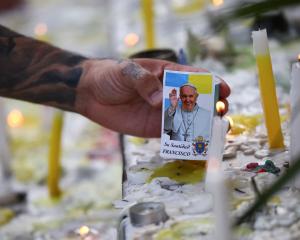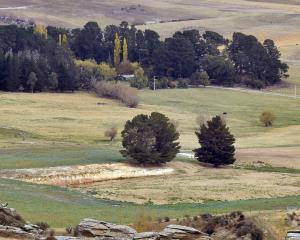The comments made last Friday (ODT, 1.10.10) by the Vicar of St Matthew's regarding God's involvement in the Canterbury earthquake, and his apparently deliberate non-involvement in the earthquake in Haiti, generated a heated response in Wednesday's "Letters to the Editor" (ODT, 6.10.10), including the charge that the ODT was publishing "theological pornography."
It greatly saddens me when the public voice of the Church, which was heard to such excellent effect when Jim Wallis spoke at First Church last week, offers something as superficial and facile as Stu Crosson did. Its negative reception was lamentable, but unfortunately deserved.
My objection is not simply to his comparison between the Haiti and Canterbury earthquakes, though this was certainly problematic, but to the fact that his comments showed an extremely selective use of Christian Scripture that has little, if anything, to contribute to our understanding of these events.
Fr Crosson's premise is that God rules the world impartially (Matthew 5:45), intervening only with good reason, and choosing not to intervene with equally good reason.
He implies that God was silent during the Haitian earthquake because of humans turning their back on God's ways, and that the earthquake itself was creation groaning as a result of sin (cf. Romans 8:18-25).
He further suggests that the care the people of Canterbury have shown for one another is a result of the blessing of God's values at work in our society.
I have no wish categorically to exclude the possibility of divine involvement in the world, but discerning such involvement is fraught with difficulties. Fr Crosson's attempt to do so makes equations between human suffering and divine punishment (Haiti) and between human survival and divine blessing (Canterbury).
He attempts to offer a "theodicy", which, put over-simplistically, is a defence of the righteousness of God in the face of obvious human suffering, but in so doing he rides roughshod over the many, competing voices of Scripture on this question.
There can be no doubt that the authors of almost all the biblical books thought that their God was involved in the world, and that he punished the wicked. Most obviously, the books of Jeremiah and Kings see this at work in the destruction of Jerusalem by the Babylonian army in 586 BCE.
According to 2 Kings 21:10-15 and 24:1-4, for example, the Babylonians attacked Jerusalem as divine retribution for the sins of King Manasseh. But this is contradicted elsewhere. In 2 Chronicles 33:12-13 this same king is forgiven for his sins, which do not then fall on the people of Jerusalem.
Then there is the question of whether this God is justified in destroying a whole city for the sins of one person, or for those of a few (cf. Genesis 18:22-32).
In some biblical traditions, people are punished not for their own sins but for those of their ancestors (Exodus 20:5-6), whereas in others this view is explicitly rejected in favour of the idea that people are punished only for their own sins, particularly when they refuse to repent (Ezekiel 18:1-32).
Other traditions still seem to question whether God can possibly be justified in punishing, when the women of a destroyed city are reduced to eating their own children to survive (Lamentations 2:20). Scarcely irrelevant to Mr Crosson's comments is the book of Job, where the friends of a suffering man reason back from his suffering to its divine cause, and to the human sin that provoked it.
Ironically, of course, Job suffers not because he has turned his back on the ways of God but precisely because he is righteous (Job 1:1), and an ideal case study for God and the heavenly adversary to discover whether a human being ever fears God without desiring a reward (Job 1:9-11). In Ecclesiastes, neither the righteous nor the wicked get their just recompense in this life.
Other traditions warn against presuming oneself to be under God's blessing. This is an issue in the Old Testament because the people of Israel are portrayed as the recipients of a divine promise (Genesis 12:1-3), which, in times of prosperity, could lead to complacency.
Thus in Amos - where, by the way, judgement comes in the form of an earthquake (Amos 1:1; 9:1) - a prosperous Israel is criticised for believing itself to be blessed, when in fact it more than others is subject to God's judgement (Amos 3:1-2; 9:7-10).
Moreover, in books such as Amos, Kings, Jeremiah, and Ezekiel, retribution only fell on Israel because the people of Israel had specific obligations to their God under a treaty (see Deuteronomy), a situation which can hardly be transferred without further ado to a modern secular society such as ours.
In the New Testament, Jesus warns his hearers: "[T]hose eighteen who were killed when the tower of Siloam fell on them - do you think that they were worse offenders than all others living in Jerusalem? No, I tell you; but unless you repent, you will all perish just as they did" (Luke 13:4-5 New Revised Standard Version).
His criticism is of those who are complacent because they have not suffered as others have. Without going into the question of whether traditions such as these are relevant at all to understanding the Haiti and Canterbury earthquakes, the books of the Bible offer a considerably more complicated and difficult picture than Mr Crosson suggests.
Leaving the Bible aside for a moment, what exactly is Mr Crosson suggesting about the people of Haiti? That they have all sinned and deserved God's benign negligence? That some of the poorest of the world's poor were struck down because a few had turned aside from God's ways? That the ancestors of those killed, maimed, bereaved, and left destitute by the earthquake earned the punishment their descendants incurred? Is there no evidence among the people of Haiti of the kind of care the people of Canterbury have shown one another after the earthquake?
I see no reason for the devastating effect of the Haitian earthquake beyond a combination of the after-effects of European imperialistic greed, governmental corruption, and international neglect.
To invoke God seems at best unnecessary, and at worst cruel, as if those who suffer from natural disasters can be abstracted into statistics that can then be used to explain God's absence from, or connivance in, their suffering.
To do theology in this way conveniently allows us to turn our eyes from the "compassionate women" who "have boiled their own children" (Lamentations 4:9 NRSV).
Perhaps, instead of intellectualising the plight of the victims of the Haitian earthquake - or the Indian Ocean and South Pacific tsunamis, Hurricane Katrina, the floods in Pakistan - we should be asking what we can do to alleviate their suffering.
What I undoubtedly share with Mr Crosson is the view that Christianity should have a voice in the public square. What is needed, however, is extreme care and careful discernment in bringing forth that voice.
• Dr James Harding is a lecturer in Old Testament Studies at the University of Otago.










